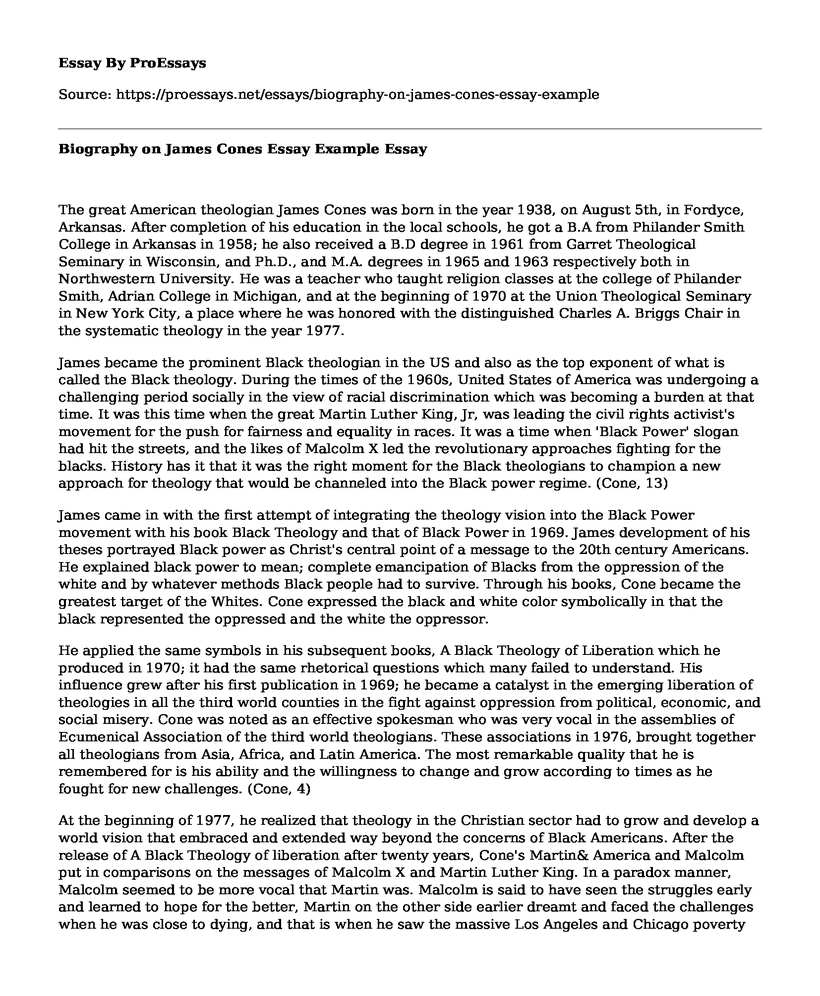The great American theologian James Cones was born in the year 1938, on August 5th, in Fordyce, Arkansas. After completion of his education in the local schools, he got a B.A from Philander Smith College in Arkansas in 1958; he also received a B.D degree in 1961 from Garret Theological Seminary in Wisconsin, and Ph.D., and M.A. degrees in 1965 and 1963 respectively both in Northwestern University. He was a teacher who taught religion classes at the college of Philander Smith, Adrian College in Michigan, and at the beginning of 1970 at the Union Theological Seminary in New York City, a place where he was honored with the distinguished Charles A. Briggs Chair in the systematic theology in the year 1977.
James became the prominent Black theologian in the US and also as the top exponent of what is called the Black theology. During the times of the 1960s, United States of America was undergoing a challenging period socially in the view of racial discrimination which was becoming a burden at that time. It was this time when the great Martin Luther King, Jr, was leading the civil rights activist's movement for the push for fairness and equality in races. It was a time when 'Black Power' slogan had hit the streets, and the likes of Malcolm X led the revolutionary approaches fighting for the blacks. History has it that it was the right moment for the Black theologians to champion a new approach for theology that would be channeled into the Black power regime. (Cone, 13)
James came in with the first attempt of integrating the theology vision into the Black Power movement with his book Black Theology and that of Black Power in 1969. James development of his theses portrayed Black power as Christ's central point of a message to the 20th century Americans. He explained black power to mean; complete emancipation of Blacks from the oppression of the white and by whatever methods Black people had to survive. Through his books, Cone became the greatest target of the Whites. Cone expressed the black and white color symbolically in that the black represented the oppressed and the white the oppressor.
He applied the same symbols in his subsequent books, A Black Theology of Liberation which he produced in 1970; it had the same rhetorical questions which many failed to understand. His influence grew after his first publication in 1969; he became a catalyst in the emerging liberation of theologies in all the third world counties in the fight against oppression from political, economic, and social misery. Cone was noted as an effective spokesman who was very vocal in the assemblies of Ecumenical Association of the third world theologians. These associations in 1976, brought together all theologians from Asia, Africa, and Latin America. The most remarkable quality that he is remembered for is his ability and the willingness to change and grow according to times as he fought for new challenges. (Cone, 4)
At the beginning of 1977, he realized that theology in the Christian sector had to grow and develop a world vision that embraced and extended way beyond the concerns of Black Americans. After the release of A Black Theology of liberation after twenty years, Cone's Martin& America and Malcolm put in comparisons on the messages of Malcolm X and Martin Luther King. In a paradox manner, Malcolm seemed to be more vocal that Martin was. Malcolm is said to have seen the struggles early and learned to hope for the better, Martin on the other side earlier dreamt and faced the challenges when he was close to dying, and that is when he saw the massive Los Angeles and Chicago poverty in the ghetto.
Cones ability and willingness to learn and teach marked his true greatness. He is one of ye most celebrated echelon of theology in all faith and races. Besides his great literature skills in writing, Cone was also an intellect and brilliant lecturer and also a fierce preacher. Well in the case that the medium is the message, then, James teachings has the most vibrant testimony in quality and charisma to his life and human relations.
Conclusion
African American theologian James Con came at a time when racism and inequality were in its highest tunes. He was known as a preacher and a writer who used his platform to advocate for change and in the fight against the oppression by the whites. His books gave hope and were used as a medium for the exchange of message that the black power movement used in the liberation movement. He together with Martin Luther King. Jr. and Malcolm X were the leaders that pushed and advocated for change at his time.
Works Cited
Cone, James H. Said I Wasn't Gonna Tell Nobody: The Making of a Black Theologian. , 2018. Internet resource.
Cone, James H. The Cross, and the Lynching Tree. , 2014. Print.
Cite this page
Biography on James Cones Essay Example. (2022, Aug 23). Retrieved from https://proessays.net/essays/biography-on-james-cones-essay-example
If you are the original author of this essay and no longer wish to have it published on the ProEssays website, please click below to request its removal:
- Japan's Practice of Ringisho Essay
- Germany Economical Analysis Paper Example
- Essay Sample on Economic Markets: Trading Goods & Services
- Essay Sample on Unlock the Benefits of Bitcoin: Digital Cryptocurrency without Banks
- Essay Sample on Promote Social Responsibility: What Hospitality Industry Can Do and Why
- Essay on Alta Gracia: Factory Subsidized to Improve Labor Standards in Dominican Republic
- Essay on Tension Between Private and Public Policing: Budgetary Challenges and Collaboration







